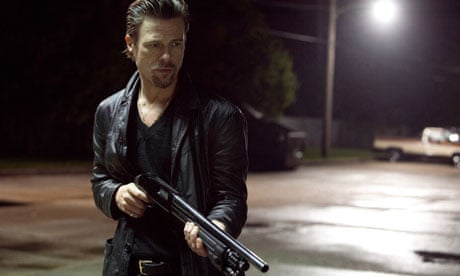Movies about assassins generally show them as ascetic samurai loners, broodingly dismantling and reconstructing their weapons as they wait for the hit in monkish seclusion, chain-smoking, keeping small talk to a minimum with their employers, who are in a similar laconic state, and who, in any case, may be secretly awed by their hitman's icy professionalism. Killing Them Softly is different. This killer, Cogan – played by Brad Pitt – is relaxed and talkative; he is craggy, leonine, casual and imperious; absolutely on top of his game, but with a flaw. He cannot kill anyone he's met, and hates to kill up close, squeamish about them begging for mercy. So he has to murder at a distance; it's what he calls "killing them softly", though without acknowledging Roberta Flack.
Cogan is part antihero, part choric observer, terrifically acted by Pitt in this compelling movie from Andrew Dominik, the director who made Chopper (2000) and The Assassination of Jesse James by the Coward Robert Ford (2007). He has adapted the 1974 crime novel Cogan's Trade by George V Higgins and updated it to the America of 2008, the era of financial meltdown and political changeover. When I first saw this at Cannes this year, I found some of the overtly satirical moments too emphatic. The TV news on in the background will persistently give us Bush or Obama at ironic moments. But maybe the film's politics are part of its swaggering insolence.
It is a violent ensemble nightmare of middle-management mobster incompetence in the tradition of Goodfellas, Pulp Fiction, Casino and TV's The Sopranos. The drama is thrillingly and casually pessimistic, a world of weary tough guys complaining about having to clear up the mess left by other screw-ups, and for less money than they'd hoped for. This is a stiflingly and reekingly unhappy male world.
Dominik deploys two classic tropes. From Pulp Fiction, there is the "Royale with Cheese" banal pre-violence conversation, and the classic gangster "betrayal" misdirection, which I associate with the buildup to Tommy DeVito's made-guy ceremony from GoodFellas. Someone gets shot, suddenly and at close range, having been lulled along with the audience into a false sense of security by a chat about what they were going to do later.
The political dimension comes in two parts. In 2008, US taxpayers were asked to bail out banks for the sake of confidence and prestige, and these taxpayers also had to tighten their belts. Here, local wiseguy Markie (Ray Liotta) has to be whacked for robbing some other wiseguys' poker game: he didn't do it, but someone has to be seen to get killed for the sake of confidence and prestige, and hitmen have to accept a reduced fee in the economic climate.
Cogan is contracted by an anonymous apparatchik played by Richard Jenkins, whose own criminal superiors are as cautious as any of the suits in corporate America: their paralysis is another symptom of the economic times. The robbery was actually done by two ridiculous jerks, Frankie and Russell, superbly played by Scoot McNairy and Ben Mendelsohn, whose boss must also now be whacked: this is Johnny "Squirrel" Amato, played by Vincent Curatola. But Cogan subcontracts this wet job, and here is where Dominik shows how Cogan is guilty of sentimental incompetence. He gives the work to his old friend Mickey, hilariously played by James Gandolfini, who to Cogan's polite dismay, shows himself to be nowadays unequal to the task of contract killing: a heavy drinker and prostitute addict who is morosely in unrequited love with one of the girls he despises. Mickey exhibits the undignified emotions Cogan hates in his own victims. Could it be that Mickey, poor Mickey, is the endgame those in the business face? If they survive, that is. He is their future, in worse shape than anything in the morgue.
Crime equals chaos in Killing Them Softly. It's a reminder of what Tom Wolfe wrote: criminals are not romantic desperados who go outside the law to get what they want. They are ruthless, greedy, stupid people who get themselves into a progressively worsening, violent mess. There is an entropy in Killing Them Softly, a spiralling down; every scene, with its quarrelling and its bitching, its bantering and its bloodsplattering, is not leading anywhere as such – it's just an open-ended vivisectional demonstration of unhappiness and confusion.
Dominik gives Pitt his grandstanding moment in terms of one satirical aria of a speech, contrived perhaps, and its moral-drawing jars with the icy amorality of all that has gone before. But it is delivered with such angrily dismissive power. This is an unrepentantly cynical take on the hope-and-change promised to the US in 2008; this year's election race makes it look even bleaker, an icily confident black comedy of continued disillusion.

Comments (…)
Sign in or create your Guardian account to join the discussion